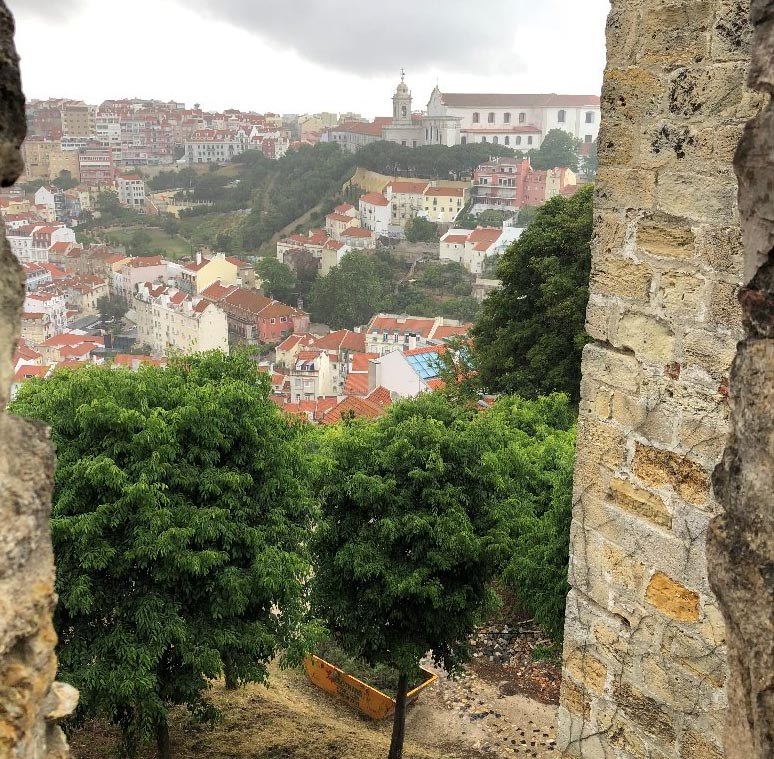Posted: June 12, 2018
“Everything about this trip was fantastic and eye-opening; from the vast green pastures to their steamy volcanic streams and their narrow streets.”

On the high parts of the Castle of Sao Jorge, seeing parts of Lisbon
When I applied to the Azores embedded course, I never imagined it to be the way I experienced it. I picked this course out of impulse because I wanted to travel before my senior year here at Penn State and to gain experience in farmland and to be honest, it was a great decision. Though it was not my first time leaving the country, it was the first time going to the other side of the world, so this was an incredible experience. Everything about this trip was fantastic and eye-opening; from the vast green pastures to their steamy volcanic streams and their narrow streets. The course consisted of traveling to two islands in the Azores and Lisbon. The Azores is a group of 9 islands that are part of Portugal. The two islands we visited were Sao Miguel, the biggest island where we spent two days and the second biggest, Terceira where another two days were spent. The last two days of the course were spent in Lisbon.
In our days in Sao Miguel, we explored the city and learned about the architecture of the island. The island is known as the "Green Island" of the Azores for its beautiful grasses and gardens. The gardens were assembled by very wealthy people that gathered different species of plants from all over the world for their pleasure, now opened to the public. One of the gardens: Terra Nostra, was built by a US consul in the island named Thomas Hickling in 1775. In my opinion, the Terra Nostra is one of the prettiest gardens we came across; it contains Jacuzzis and pools with thermal water due to the volcanic eruptions that are surrounded by an abundance of different plant species. It is just incredible to see what people in the past have done to accommodate what occurred naturally on this island. As we walked through the capital of Sao Miguel, Ponta Delgada, we came across many beautiful big churches, such as the Matriz Church of Sao Sebastiao and Igreja do Colegio, these and other churches had carved cedar alters that show off their admiration to the church and God. Every detail was well sculptured and designed. We also visited a tea plantation and walked around the factory to see their equipment. Sao Miguel also has many volcanic craters that people take advantage of them to cook meals such as a dish calls cazido which contains veggies, pork, chicken, and beef.
Going to Terceira was a whole different experience from Sao Miguel, it was less of a city and more of pastures. In Terceira, we had the opportunity of seeing amazing views of the island from high altitudes and visiting dairy companies. The first company (Queijo Vaquinha), we woke up early to see their milking process, and I was against waking up at 5 o'clock in the morning, but as soon as the process began we had a chance to milk the cow and taste the cheese, and it all changed; it was worth waking up early. The company also had adorable baby goats and calves that we fed. The Second company named Quinta dos Acores, we visited was a dairy and meat producer, and we saw the meat cutting and packaging process. During our stay at Terceira, we had the opportunity to meet students from the University of the Azores who are also studying the same field as the group. It was nice to have other peers to compare our experiences.
In our last two days, we went out sightseeing the city of Lisbon. We went to the Castle of Sao Jorge, which housed elegant peacocks and gave us such a fantastic view of the city. We visited inside the Jeronimos Monastery and the church, where you can see the aesthetics of the details carved on the stones and pillars of the buildings.
Overall, I think this study abroad has been a wonderful experience. The course was not "cattle" intense as I thought it would be since the islands are substantial dairy producers. Going to the Azores defiantly widen up my horizons as I became comfortable with cattle as I fell in love with the adorable calves and goat kids. We tried many kinds of cheese and delicious foods that satisfied my wellbeing. I think traveling abroad is important because it gives you the opportunity to study other cultures and compare them to others and perhaps your own. Every island and village have different ways of expressing their beliefs you can even sense the aura they abstract. You also make connections with others that can be very beneficial in a social or business way.
Ag Sciences Global
Address
106 Agricultural Administration BuildingUniversity Park, PA 16802
- Email globalag@psu.edu
- Office 814-863-0249
- Fax 814-865-3055
Ag Sciences Global
Address
106 Agricultural Administration BuildingUniversity Park, PA 16802
- Email globalag@psu.edu
- Office 814-863-0249
- Fax 814-865-3055

